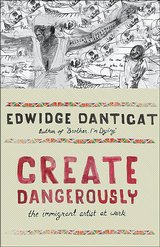 Create Dangerously : The immigrant artist at work
Create Dangerously : The immigrant artist at workby Edwidge Danticat
Princeton University Press
‘The poet turns the world to glass, and shows us all the things in their right series and procession,’ Edwidge Danticat writes, quoting Emerson. In these twelve eloquent essays, Danticat does just that as she examines the many dilemmas of being a creative person exiled from their homeland,. Through the prism of her personal experiences and tenuous associations with her homeland, and in her interpretations of its troubled history and that of individuals she has interacted with, Danticat paints us a portrait of her Haiti – her ‘floating world’ as it were, and its tortuous struggle for peace and stability.
‘Create dangerously, for people who read dangerously’. These words by Camus have defined Danticat’s development as a writer, and they are central to Danticat’s defence of what she deems the artist’s purpose – to bear witness. In essays like ‘Daughters of Memory’, ‘I Speak Out’ and ‘Acheiropoietos’ , she profiles Haitians who have done just that – borne witness to the atrocities committed on Haitians , displaying what she calls ‘guapa’ – a courageous beauty.
In the opening paragraphs of ‘Create Dangerously’, the first of these quiet yet powerful examinations of identity, Danticat walks us, with excruciating slowness through an execution. The two men at the centre of this gruesome tableau, Marcel Numa and Louis Drouin are members of a rebel group trying to bring down the Duvalier dictatorship, and the public spectacle of their deaths will haunt generations of Haitians. They certainly haunt Danticat, even though she wasn’t even born at the time of this incident. Quoting Camus again - “..a person’s creative work is nothing but a slow trek to rediscover, through the detours of art, those two or three images in whose presence his or her heart first opened.”- Danticat’s essays reveal how these, and other horrors have been akin to creation myths for creative Haitians like her, intrinsic to what Basquiat calls ‘cultural memory’ in ‘Welcoming Ghosts’, Danticat’s incisive exploration of the young artist’s work and influences.
Dangerous writing – and reading- had something of a rich past in Haiti under Duvalier, where even the suggestion of dissent was liable to get you killed. The title essay of the book examines how, in the claustrophobia that was life under the Duvaliers, people chose clandestine methods of voicing their anguish, through the secret staging of plays and the reading of classics by foreign, or long dead authors like Cesaire, Fanon and Camus. “The fact that death prevented one from being banished,” she wryly notes, “..made the ‘classic writers all the more appealing. “
Sadly, lesser mortals do not always enjoy this posthumous immunity. Does death reverse exile, Danticat wonders in ‘The Other Side of the Water’ , as she recalls her attempts to have her cousin Marius’s body flown home from Miami to Haiti for burial. For Marius, an illegal immigrant with AIDS, lacks the necessary documents needed for his final flight home and must wait in legal limbo until a solution -or his passport – is found.
Creative stifling, she observes, has effectively silenced whole generations of her countrymen; in turn, it has made the few, like her, who choose to speak out, seem like martyrs.. ”crazy Saints (who) stared out at the world, like lunatics – or quietly, like suicides..” This is not a sainthood Danticat wears lightly; for just under the surface of her words lurks her guilt at having ‘escaped’ (through migration to the United States) and becoming an ‘accident of literacy’ while thousands of Haitians remain uneducated and poverty ridden. She struggles with this notion of being privileged, and with her own identity, as she is repeatedly accused of being 'dyaspora' , and incapable of authenticity when writing about Haiti. Danticat faces this alienation even at home; an elderly relative mourning her dead son says, ‘‘I know it’s your work, but please don’t write what you think you know about Marius.”
Perhaps this is one of the crosses the immigrant writer must bear, regardless of their creative voice – this obligation to be ambassador of a culture and people she is rooted in through the accident of birth. It is a cross Danticat refuses , however; rather she asserts that , by virtue of her craft, she transcends her own geographical boundaries, taking on, with every reading of her work, the nationality of the individual reader. ’Are you free, my daughter?” asks a character at a crucial juncture in Danticat’s debut novel, ‘Breath, Eyes, Memory. Danticat seems to pose that very question to herself repeatedly. ‘Walk Straight’, for instance, describes her guilt and confusion over being accused of misrepresenting Haiti in her writing, particularly over the issue of ‘virginity testing’ that several characters in her debut novel endure. ‘I exploit no one more than myself’, she argues, emphasising her role as a fiction writer, who merely borrows from the truth around her. And yet, a hint of self deprecation creeps into her writing, as she describes, in ‘Flying Home’, how she was ‘at work’ during a national crisis, the inverted commas being her own.
As a writer, Danticat finds she must also battle a kind of collective amnesia. Recalling the sabliyes -the forgetting trees from Haitian lore, that slave ancestors stepped under to free themselves of their memories and dull the pain of leaving home, Danticat observes that the Haitian psyche seems unwilling to step away from their shade, choosing to forget their long and painful history of slavery. It is a history that repeats itself; for Haiti remains a lesser ‘other’ to more powerful neighbours like the United States, even during national crises like the earthquake that ravaged the island earlier this year. In the moving ‘Our Guernica’, the final essay in this collection, she reflects on this inequity, even as her family calmly deals with the loss of loved ones in the earthquake, and begin the process of rebuilding their lives.
It is these images of quiet resilience that are perhaps most telling of Danticat’s floating world, of a country picking up the pieces of its shattered identity yet again – a country and a people undeniably guapa. And it is in the unflinching portrayal of these people and this country, in Danticat’s graceful and passionate commitment to bearing witness to their anguish and their joys, that we glimpse the guapa in her writing as well.
Thanks to Princeton University Press for sending us a copy of the book to review.






No comments:
Post a Comment